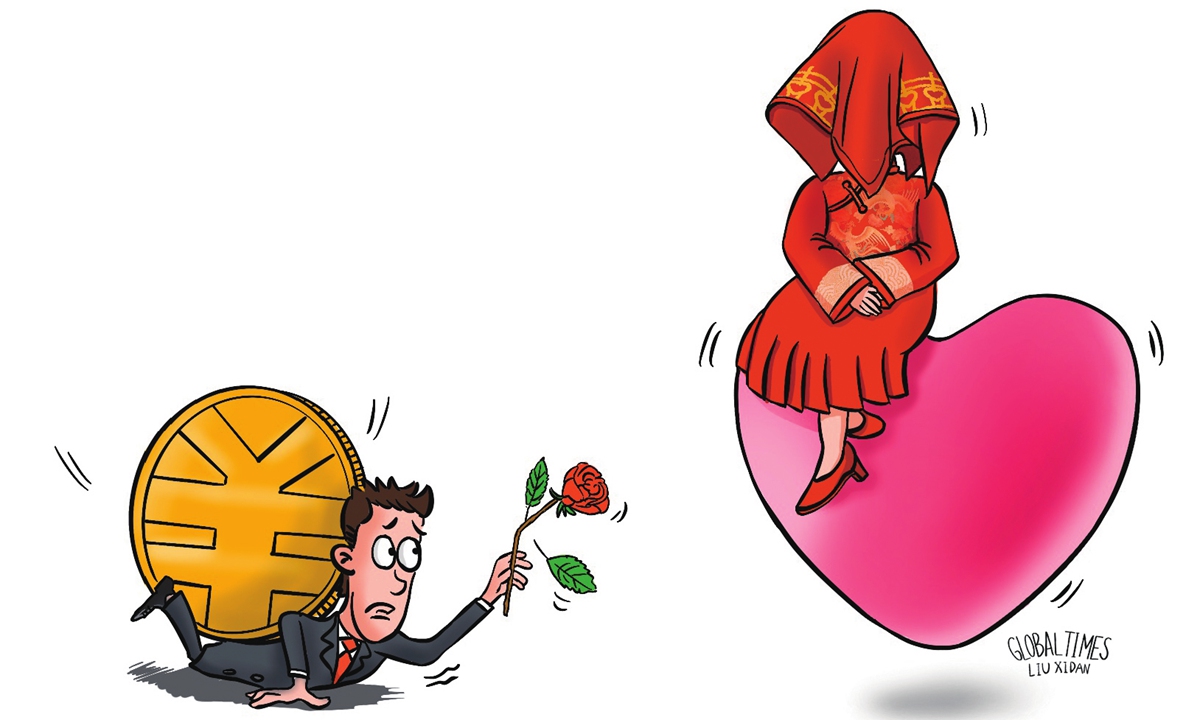
Illustration: Liu Xidan/Global Times
In the beginning of the year of 2023, a young man's wedding turned sour in Central China's Hubei Province as the original betrothal gift of 150,000 yuan ($22,147) he and his bride had agreed upon was suddenly raised to 200,000 yuan by her family.
Betrothal gifts are a headache for many young men in China, especially those living in rural areas. As the Spring Festival, which falls on January 22 this year, draws near as an auspicious date to tie the knot, eligible men who are being hounded by their parents to hurry up and get married will be faced with a challenge.
In a nonofficial nationwide "bride price" ranking in 2022, East China's Jiangxi Province went to the top with 380,000 yuan, not including a car or an apartment, which is really a whopping price for ordinary wage earners. For some young women, or their parents, asking for such an amount is a way to show their "value" and test their partners' devotion to them.
The bride price is one of the traditional marriage customs in China. It originated from the ancient Na Zheng Li (Ritual of Paying Tribute). After the engagement, the bridegroom-to-be would send betrothal gifts, or a bride price, to his fiancee's family as part of an important ceremony. In return, the woman would give back the food from the man or send some clothes as presents instead, and on the wedding day, the bride would also take a dowry to the bridegroom's home. As women were in a disadvantaged position in ancient China's agricultural society, a bride price was regarded as compensation for the changes in a woman's social position after marriage as well as a symbol of their future status in their husbands' family. With the development of the commercial economy, these betrothal gifts gradually changed into money.
During the past few decades, betrothal gifts have gotten out of hand as in the case of the Hubei bridegroom. In terms of a specific amount, this should be based upon the financial ability of the groom's family, instead of becoming a bargaining chip used by the bride's family or a way of collecting funds to show off and compete with others. Indeed, it is not worth it if a loving couple gets separated just because of a bride price.
Although some people dislike the practice, they feel they have to follow suit as they worry about pressure from friends and relatives. To address this issue, the Chinese government has adopted many measures to divert this traditional social practice. Since 2008, the Ministry of Civil Affairs has promoted marriage reform. In 2021, it enacted a Civil Code that prohibited marriage as a means of accumulating wealth. From April to September 2021, it also established 32 experimental zones across the country to carry out national reform and change marriage customs by simplifying wedding ceremonies. At the end of 2022, it issued a warning to curb this convention.
As a result, Jiangxi Province has also taken measures to rein in "sky-rocketing" bride prices through training and organizing collective weddings. Today, some village girls only ask for 30,000 yuan from their boyfriends' family, a drop to one-fifth of original standards, and some of them are even rejecting any money given for their weddings.
Marriage is not a business. Treating bride prices as a bargaining chip has twisted its original purpose as well as its symbolic meaning. The harmful practice of competing for higher bride prices should be abandoned and the fine Chinese tradition of pursuing a happy life through hardworking must thrive.




